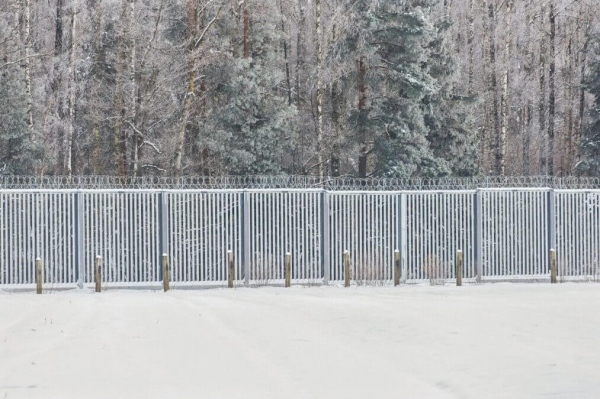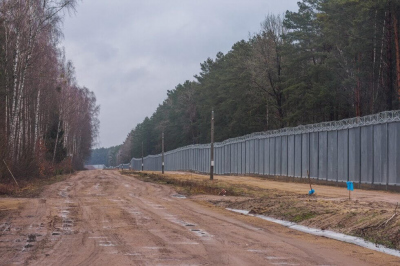
In December 2023, the courts ruled in favour of nine humanitarian aid workers. The district courts in Hajnówka, Siemiatycze and Białystok acquitted the persons charged by the Border Guard with an offence under Article 54 of the Code of Administrative Offences. This provision states that anyone who violates the “peacekeeping measures”, rules for behaviour in public places issued as delegated regulations under the Act, is to be punished with a fine of up to PLN 500 or a caution. The Border Guard has accused those humanitarian aid activists of violating the ban on entering the border strip. This ban results from Regulation No. 7/2021 of the Governor of the Podlaskie Province.
The accused activists have received the free legal aid offered by the HFHR and the Szpila Collective to all persons harassed by the authorities in connection with the provision of humanitarian aid on the Polish-Belarusian border. The accused persons were represented by Jarosław Jagura, an attorney working with the HFHR. The courts found that their actions did not constitute an administrative offence.
The court in Hajnówka, which acquitted 3 persons and cancelled a fine, argued that the regulation that formed the basis for imposing the fine was issued beyond the limits of statutory authority, as the ban extended to the entire section of the border strip, which was contrary to the wording of Article 9 (3) of the State Border Protection Act. The court found that according to this provision, the entry ban could only be imposed on “certain sections of the border strip”. Furthermore, the court found that restrictions on rights and freedoms can only be established by a law and that the province governor’s regulation did not fulfil this condition. The court ruled that the province governor had exceeded his powers. In addition, the court emphasised the need to examine whether the peacekeeping measures referred to in Article 54 of the Code of Administrative Offences are constitutional and whether they were issued in accordance with the constitutional principles for the enactment of basic laws. The court in Białystok also emphasised that the circumstances of the accused persons’ behaviour are relevant and that they acted in order to save lives.
These judgements are part of a series of judgements stating that the provision of humanitarian aid is perfectly legal and should not be prosecuted. “We welcome the positive rulings of the courts, but point out that simply trying to hold humanitarian aid workers accountable should not be the case.
There are other court judgments that show that the Border Guard should not impose penalties on persons who enter the border strip and throw objects across the border with Belarus. The Border Guard should change its practice, because these legal procedures unnecessarily expose people transporting humanitarian aid to the need to participate in court proceedings in a situation where acquittals are repeatedly handed down in these cases”, says HFHR lawyer Jarosław Jagura.
“Since the beginning of the humanitarian crisis, the authorities and their uniformed services have carried out various activities aimed at intimidating, discouraging and exhausting people providing humanitarian assistance to people on the move. One of these activities is the imposition of fines for minor administrative infractions – which are sometimes unavoidable in order to effectively help people in need. Throughout the winter of 2023, we provided warm food, drink and clothing to the hypothermic, hungry and exhausted people trapped on the eastern side of the fence. To do this, we had to enter the border strip, for which the Border Guard issued us fine citations, which we generally did not accept. This resulted in many court cases that dragged on for months. I am of course glad that the courts have not only refused to confirm our guilt in all the cases that have been resolved so far, but have also recognised the flawed nature of the regulations that exposed us to legal consequences. However, it is regrettable that such cases have been pursued at all – unnecessarily consuming the entire judicial apparatus and considerable taxpayers’ resources. Helping is legal and necessary. And we will not be intimidated”, says Aleksandra Chrzanowska from the Association for Legal Intervention (SIP) and the Border Group (Grupa Granica).
“Even though my fine was cancelled, I think it's a scandal that it had to come to court at all. The criminalisation of humanitarian aid and solidarity with people on the move is part of the inhumane policy of isolating Poland and Europe. We must and will defend ourselves against this, this is our response to the repression of the state”, commented one of the acquitted defendants on the judgment.
“I have the impression that the whole situation was designed to intimidate us. During our detention for several hours, a masked man (in a balaclava) was standing behind our backs. He wore a helmet, had a uniform without insignia and carried a rifle. He was not on the witness list, so we do not know who he was, he did not testify. The court costs and the compensation awarded to the acquitted are paid with taxpayers’ money. Maybe it’s time for the superiors of the officers who fined us to take responsibility for their orders, including financially,” says one of the people whose fine was cancelled.


